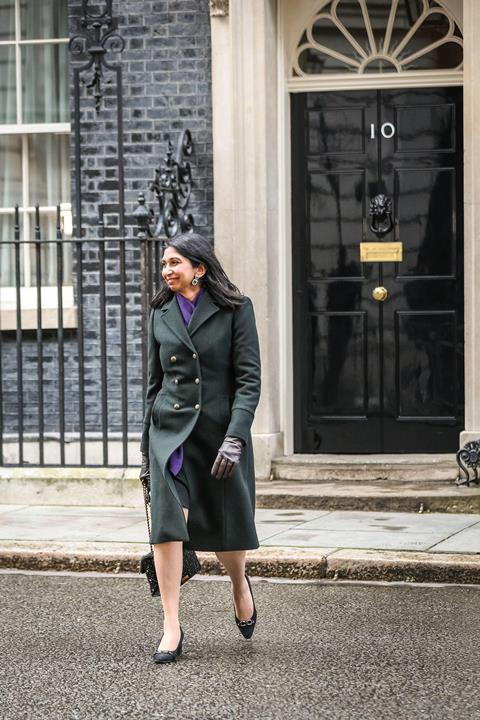‘Making law and politics work together’ is the motto of the Attorney General’s Office, Suella Braverman QC (pictured below) told the justice committee last week.

The holder of what she described as a ‘unique’ and ‘ancient’ office has a delicate balance to strike, being the government’s chief legal adviser and acting independently in the public interest.
But critics suggest the role, which is no longer held by a pre-eminent lawyer, has become increasingly politicised. So is it time for the holder no longer to be the head of the bar?
Two former government lawyers think so: Carl Gardiner, who worked in the AG’s office from 2005-2007 under Labour’s Lord Goldsmith; and Sir Jonathan Jones, former Treasury solicitor and chief legal adviser to the government.
Gardiner blames Braverman for politicising the office more than her predecessors; in particular, he points to the controversy over the government’s plans to change the Brexit deal. And while Jones resigned after advising the government that the change would breach international law, Braverman (and the then solicitor general, Michael Ellis) remained in office, which Gardiner suggests made her advice ‘look partisan’.
Politics aside, Gardiner says the link is just ‘out of date’. Jones reluctantly agrees, telling me: ‘It’s probably a role whose time is up.’

Says Jones: ‘There’s a bit of me that will be sad because it will spell the end to an unusual relationship with the legal profession.’
Arguably, the role has long been politicised – from Patrick Hastings KC’s decision to discontinue a prosecution against a communist newspaper editor for incitement to mutiny in the 1920s, to Goldsmith altering his advice on the legality of the UK’s involvement in the Iraq War.
In 1964, Lord Elwyn-Jones, the first AG to Labour PM Harold Wilson, said it would be ‘disingenuous’ to think that the AG was a ‘detached creature who has nothing to do with politics’.
Braverman told the committee that ‘the tension between the legal, political and constitutional has been present for as long as the role has existed’. She insisted there are areas where she switches off her ‘political antennae’ and acts as guardian of the public interest – for example, considering unduly lenient sentence referrals. Yet she acknowledged occasions where she brings politics ‘more to the fore’.
In a report on the role by right-leaning thinktank the Policy Exchange, former lord chancellor and solicitor general Robert Buckland describes the law officers as the ‘submarines of government, working below the radar and surfacing only when there is a significant issue to be addressed’.
But, for some, Braverman comes up for air too much – especially on social media. She has been criticised for tweeting her support for Boris Johnson despite the clear prospect of a police investigation into so-called PartyGate. And her tweet that she is considering referring the case of the Colston Four to the Court of Appeal, following their acquittal, together with her support for the government’s desire to rein in the judiciary, also suggest to some that her duty to uphold the rule of law is secondary to her political loyalty.
She is also the first AG to have a SpAd – a special adviser who is a political appointee.
The convention for the AG to be head of the bar dates from the time when the holder was the lawyer to the monarch and took precedence in court over all other barristers: a role recognised in a case from 1834, AG v Lord Advocate.
But as one former AG, Dominic Grieve QC, points out, that was before the Bar Council had a chair to lead it. Arguably, since Sir Hardinge Giffard QC became the first bar chair in 1883, the link has been unnecessary.
Today, there are fewer lawyers in government and some recent AGs had to be given the rank of QC on their appointment.
Severing the tie with the bar, says Grieve, might mark the profession’s displeasure that the AG has become an ‘ordinary’ government minister. But, he insists, ‘uncoupling’ the AG from their professional background would be a mistake that would detach them from the standards of probity and conduct of the bar.
Having held both posts, Lord Goldsmith says that, as bar chair, he welcomed contact with the AG on government policy, while as AG he valued the link to listen to the bar’s concerns.
Braverman is ‘honoured’ to head the profession and is in ‘regular contact’ with bar leaders. She said that she regularly meets the bar chair, circuit leaders and the chair of the Criminal Bar Association, and values the ‘open and productive working relationship I have built with them’.
Though less effusive, current bar chair Mark Fenhalls QC says the attorney general’s ‘participation is both longstanding and welcomed’.
Still, the link may inevitably break. As Jones notes, there is no rule that says the AG has to be a barrister; sooner or later they could be a solicitor.
As Jones says: ‘When that happens, the idea that the attorney general would be head of the bar would no longer make sense.’
Catherine Baksi is a freelance journalist and qualified barrister































No comments yet